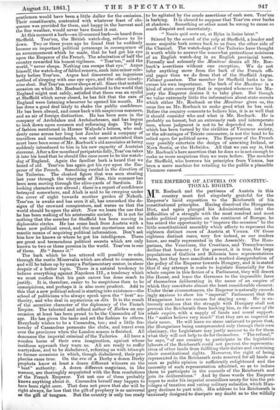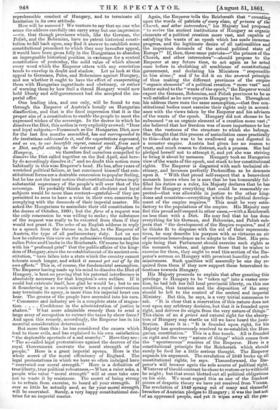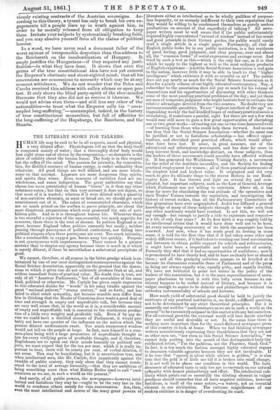THE EMPEROR OF AUSTRIA ON CONSTITU- TIONAL RIGHTS.
Roebuck and the partisans of Austria in this country must feel singularly grateful for the Emperor's lucid exposition to the Reichsrath of his constitutional principles. Having dissolved the Hungarian Diet, and again plunged his Administration into the difficulties of a struggle with the most resolved and most noble political population on the continent of Europe, he has seized the opportunity to "improve the occasion" to the little constitutional assembly which affects to represent the eighteen distinct races of Austria at Vienna. Of those eighteen distinct races, very few indeed, as our readers know, are really represented in the Assembly. The Hun- garians, the Venetians, the Croatians, and Transylvanians decline that honour ; for the present, it is true, the large populations of Gallicia and Bohemia have representatives there, but they have manifested a marked disapprobation of the policy of the Emperor towards Hungary, and it is stated that if any attempt is made to legislate financially for the whole empire in this fiction of a Parliament, they will desert the House, and leave the Germans to the impossible farce of themselves deliberating in the name of an empire of which they constitute almost the least considerable element. Under these circumstances, the Emperor is naturally exceed- ingly anxious to show his "imperial" Parliament that the Hungarians have no excuse for staying away. He is ex- tremely anxious that the struggle with Hungary shall not prevent the Reichsrath from backing him, in Me name of the whole empire, with a supply of funds and moral support. He "makes believe very much" that they are as imperial as their name. He will leave no stone unturned to prove that, the Hungarians being unrepresented only through their own obstinacy, the Legislature may justly assume to do for them what they will not help to do for themselves. "The refusal," he says, of one country to participate in the legislative labours of the Reichsrath could not prevent the representa- tives of other lands from fulfilling their duties and exercising their constitutional rights. Moreover, the right of being represented in the Reichsrath rests reserved for all lands as soon as public opinion is sufficiently enlightened and the necessity of such representation admitted, so as to induce them to participate in the councils of the Reichsrath and join its deliberations." And by these words the Emperor hopes to make his imperial councillors usurp for him the pri- vileges of taxation and voting military subsidies which Hun- gary declines to part with. His address to his subsidies, is anxiously designed to dissipate any doubt as to the wilfully reprehensible conduct of Hungary, and to terminate all hesitation in its own attitude.
How will he succeed ? We venture to say that no one who scans the address carefully can carry away but one impression —viz, that though provinces which, like the German, the Polish, and the Bohemian, have no patent historical consti- tution to fall back upon, may find it answer to establish some constitutional precedent to which they may hereafter appeal, it would have been gross folly in the Hungarians to abandon an impregnable historical position in exchange for a central constitution of yesterday, the solid value of which almost every word which the Emperor utters with any conviction tends to envelop in doubt and shadow. Let us look at this appeal to Germans, Poles, and Bohemians against Hungary, and see whether it ought to have the effect of exasperating them with Hungarian ingratitude and obstinacy, or rather of warning them by how frail a thread Hungary would now hold liberty and self-government had she accepted the im- perial offer. One leading idea, and one only, will be found to run through the Emperor of Austria's homily on Hungarian disaffection, and that is the fixed impression that it is the proper aim of a constitution to enable the people to meet the expressed wishes of the sovereign. In the decree in which he dissolves the Diet, this notion is very explicitly avowed: "Dear and loyal subjects,—Forasmuch as the Hungarian Diet, now for the last five months assembled, has not corresponded to the invitations addressed to it, and the expectations expressed, and as we, to our heartfelt regret, cannot await, from such a Diet, useful activity in the interest of the Kingdom of liCungary, . . . we therefore feel ourselves compelled to dissolve the Diet called together on the 2nd April, and here- by do accordingly dissolve it ;" and no doubt this notion runs habitually in this wise Emperor's head. He has, after years of wretched political failure, at last convinced himself that con- stitutional forms are a desirable concession to popular feeling, but he has not the least notion that constitutional forms imply substantial supremacy- of the people's will over that of the sovereign. He probably thinks that all obedient and loyal subjects would be more than content—grateful—if they are permitted to seem to have a voice in their own concerns by complying with the demands of their imperial master. He asked the Hungarians to assimilate their old constitution to the decree of October, 1860; but the form of a request was the only concession he was willing to make ; the substance of the request was really to be extorted from them if they would not grant it. The echo of an English address in reply to a speech from the throne is, in fact, to the Emperor of Austria, the type of all parliamentary duty. Let us see how he enforces this view on the submissive Germans and the sullen Poles and Czechs in the Reichsrath. Of course he begins with his "profound grief" that the public affairs of the king- dom of Hungary, since the re-establishment of its ancient con- stitution, "have fallen into a state which the country cannot tolerate much longer, and which it cannot get out of by its own efforts." This is, of course, the fundamental assumption. The Emperor having made up his mind to dissolve the Diet of Hungary, is bent on proving that his paternal interference is absolutely necessary for that kingdom's own welfare. If it could but extricate itself, how glad he would be ; but to see it floundering in so much misery when a royal intervention may terminate its agony, is more than his imperial heart can bear. The groans of the people have ascended into his ears. "Commerce and industry are in a complete state of stagna- tion Confidence in the administration of justice is shaken." What more admirable remedy than to send a large army of occupation to extract the taxes by sheer force? And upon this remedy, accordingly, the Emperor has in his merciful consideration determined.
But more than this : he has considered the causes which lead to these evils, and has explained to his own satisfaction "the deplorable spectacle of a sad anarchy." Here they are : "The so-called legal protestations against the decrees of the royal Government enervate the moral strength of the people." Here is a great imperial apergu. Here is the whole secret of the moral effeminacy of England. The legal protestations in which we have so often indulged have "enervated our moral strength." Here is a definition of true liberty, true political rob ustness,—When a ruler asks, a people who value "moral strength" will at once take care not to waste it by resistance. The secret of being strong is to refrain from exercise, to hoard all your strength. If ever so little be actually used, so far your moral strength will be enervated. Surely, a very happy constitutional doc- trine for an imperial master. Again, the Emperor tells the Reicheratb. that "counting upon the words of patriots of every class, of princes of the Church, and other interceders," his Majesty had proposed "to revive the ancient institutions of Hungary as organic elements of a political creation more vast, and capable of satisfying the wants of an epoch which has made immense progress, and the legitimate desire of all nationalities and the imperious demands of the actual political state of Europe !" 1,f, then, these same patriots-.-" the princes of the Church, and other interceders"—should propose to the Emperor at any future time, to act again as he acted once before in abolishing all semblance of constitutional government, and declaring his Ministers "responsible to him alone ;" and if he did it on the avowed principle of thus making the different provinces of the empire "organic elements" of a political creation "more vast" and better suited to the "wants of the epoch," the Emperor would expect the German, Bohemian, and Polish provinces to be as well satisfied as he now expects Hungary to be. Throughout his address there runs the same assumption,—that free con- stitutional bodies must exercise their rights only in accord- ance with the views taken by the Emperor and his advisers of the wants of the epoch. Hungary did not choose to be subsumed "as an organic element of a creation more vast ;" she believed that her freedom was of more importance to her than the vastness of the structure to which she belongs. She thought that this process of assimilation came practically to this—that she was to be swallowed up and digested in a monster empire. Austria had given her no reason to trust, and much reason to distrust, such a process. She had pledged herself not to attempt it, and yet she was striving to bring it about by menaces. Hungary took an Hungarian view of the wants of the epoch, and stuck to her constitutional rights. The Emperor is disgusted with such technical ob- stinacy, and becomes perfectly Pecksniffian as he descants upon it. "With that proud self-respect that a benevolent monarch knows when he is sure that he has honourably ful- filled his duties as a ruler, his Majesty declares that he has done for Hungary everything that could be reasonably ex- pected—that was allowable in justice to the other king- doms and countries—everything which the political develop- ment of the empire requires." This must be very satis- factory to the populations of the empire. His Majesty may feel this proud self-respect in other cases,—with a Reichsrath no less than with a Diet. He may feel that he has done everything for his German, and Bohemian, and Polish sub- jects that "the development of the Empire requires," and if he thinks fit to dispense with the aid of their representa- tives, he may describe his purpose with as virtuous an air of conscious benevolence as he adopts to the Diet. His prin- ciple being that Parliament should exercise such rights as the monarch wishes, and ignore those that he wishes to exercise for them, they ought to read this section of the Em- peror's sermon on Hungary with prescient humility and sub- missiveness. Such qualities will assuredly be one day re- quired from them if they now support these benevolent in- tentions towards Hungary. His Majesty proceeds to explain that after granting this privilege to Hungary to be "taken up" into a vaster crea- tion, he had left her full local provincial liberty, on this one condition, that taxation and the disposition of the army should be left to the control of the central and imperial Ministry. But this, he says, is a very trivial concession to ask. "It is clear that a reservation of this nature does not rest upon any arbitrary decision, but that it is founded upon right, and derives its origin from the very nature of things." This claim of an et priori and natural right for the absorp- tion of Hungary may startle us till we have heard the justi- fication. Here it is : "It is founded upon right, for his Majesty has spontaneously resolved to re-establish the Hun- garian constitution." This is a fine touch. All is founded on right and the very "nature of things" which comes from the "spontaneous" resolves of the Emperor. Here is a constitutional principle for the Reichsrath which should surely be food for a little serious thought. The Emperor expands his argument. The revolution of 1849 broke up all constitutional rights, he says. Thenceforward, the Em- peror's will became again the sole source of political right. Whatever of the old contract he chose to restore or to withhold he might; but that event blotted out all political obligations on his side. We must regard this as one of the frankest pieces of despotic theory we have yet received from Vienna. The revolution of 1849 sprang out of many and shameful breaches of Austrian pledges to Hungary ; it was the last act of an oppressed people, and yet it wipes away all the pre- viously existing contracts of the Austrian sovereigns. Ac- cording to this theory, a tyrant has only to break his own en- gagements till a people rises up in wrath against him, in order to be morally released from all obligation to keep them. Irritate your subjects by systematically breaking faith, and you may absolve yourself from all the claims of political honour.
In a word, we have never read a document fuller of the worst animus of irresponsible despotism than this address to the Reichsrath on the insubordination of Hungary. It amply justifies the Hungarians—if they required any justi- fication—in what they have done. It shows that even the germs of the true constitutional idea have not yet entered the Emperor's obstinate and short-sighted mind; that all his concessions are concessions to necessity which may be at any moment withdrawn. We do not wonder that the Poles and Czechs received this address with sullen silence or open pro- test. It only shows the blind party-spirit of the slow-minded Germans that they also did not so receive it likewise. We would not advise even them—and still less any other of the nationalities—to trust what the Emperor calls his "unex- ampled long-suffering,"--unexampled, indeed, in the history of true constitutional monarchies, but full of affinities to the long-suffering of the Hapsburgs, the Bourbons, and the Stuarts.
































 Previous page
Previous page